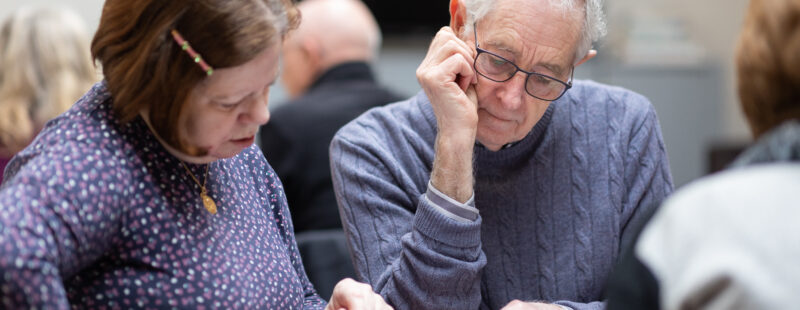Sara Ryan, Manchester Metropolitan University and Jane Maddison, University of York
Accelerated Experience-Based Co-Design
We recently completed a research project, funded by the National Institute for Health and Care Research, to explore whether an effective approach to co-designing improvements in healthcare would transfer to a social care setting, using loneliness support as our exemplar. This approach – Accelerated Experience-Based Co-Design (AEBCD) – brings together people who provide and draw on support to identify shared priorities for improvement and work up practical solutions. Our final report ‘Understanding and using experiences of social care to guide service improvements: translating a co-design approach from health to social care’ will be published shortly.
The discovery phase of the research project
The work was divided into two stages: Discovery and Co-design. In this blog we focus on the Discovery stage. This work involved interviewing people in depth about their experiences of loneliness and related support from which a short film was created for use in the Co-design stage. A diverse sample of 37 people across England with experience of loneliness were interviewed. They were encouraged to talk about their experiences and questions included asking people about famous figures they thought were lonely. Our findings showed that loneliness is complicated and may stem from unfulfilled interpersonal social needs but also from wider undermining and invalidation of people’s social identity. Unmet support needs meant participants felt unheard, which perpetuated feelings of abandonment and social alienation. Furthermore, the stigmatisation of loneliness meant many participants endured loneliness in silence. We concluded that these findings should be considered when developing interventions that aim to ameliorate loneliness.
Lived experiences and ‘touch points’ in related support
We used themed video and audio clips from people’s stories to compile a short film (around twenty minutes in length) which captured people’s experiences of loneliness and ‘touch points’ in related support; that is, examples of good practice in support and of where it could be improved. For example, one participant talked about how he was gently nudged by a support worker to attend a support group, while another described the devastating impact of a HIV drop-in service being withdrawn owing to funding coming to an end.
The film, along with more detail from the interviews, are now available. These materials include topic summaries, for example ‘Loneliness as a lack of connection’, ‘Weekend loneliness’, ‘Loneliness and Pets’ and ‘Home, culture and loneliness’. These resources may help people feel less alone and can also be used in courses and training for social workers and others who support people experiencing loneliness.
What we found and next steps
Known in AEBCD as a ‘catalyst film’, its use is a distinctive component of the approach. In the Co-Design stage of our study, Doncaster Council led a local AEBCD project, partnered by Doncaster’s Social Isolation and Loneliness Alliance, to co-design improvements in loneliness support. The catalyst film was viewed in an initial series of workshops to prompt discussion around improvement priorities and helped build a coalition of intent between workers and people with experience of loneliness to take forward into their practical co-design group work.
Overall, our process evaluation found that using AEBCD was appropriate for this work and acceptable to participants. We are currently preparing additional resources for the Social Care Talk website from the Co-Design stage to support others who may wish to use AEBCD to improve local loneliness support.





No comments on this article yet. Please feel free to submit a comment below.
By submitting a comment you grant Campaign to End Loneliness a perpetual license to reproduce your words and name/web site in attribution. Inappropriate and irrelevant comments will be removed at an admin's discretion. Your email is used for verification purposes only, it will never be shared.